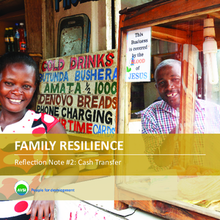The Burning Question addressed in this reflection piece is: How necessary and effective are cash transfers as a component of the economic strengthening pathway, hypothesized as crucial for the project goals of building family resilience as a means of preventing child-family separation or ensuring successful reintegration of children into family care?
This Reflection Note is intended as a means for AVSI staff and implementing partners on the FARE project (a project of ASPIRES) to capture emerging learning as relates to the theory of change elaborated during project design. The methodology used for this background note was desk review of project proposal documents and reference materials, complemented by semi-structured interviews with AVSI and FARE staff.
The economic strengthening pathway incorporated into the FARE project design borrowed from AVSI’s SCORE graduation model also implemented in Uganda as well as from other studies on economic strengthening for highly vulnerable households. FARE incorporated consumption support through regular, time-bound cash transfers at the household level to be used in a limited number of cases where households were facing severe levels of destitution that would jeopardize the household’s ability to participate in project activities. More information about SCORE can be found at: http://www.avsi-usa.org/score.html
The primary justification for consumption support as the first step of an economic strengthening pathway is to alleviate the basic needs of all members, including food, shelter, clothing and protection, so that the household can build assets and spend energy on longer term needs and goals via savings groups and investments in business activities.
In the specific case of FARE, in which the ultimate goal is that children and youth are living in stable and resilient households with community support, targeted initial consumption support took on two hypothesized functionalities. In reintegration cases, the function of the cash transfer would be to provide the conditions for reintegration to be possible and to take hold. In prevention cases, the function of the cash transfer would be to reduce or alleviate the conditions which lead to separation.
AVSI selected this question as the first Burning Question to unpack during this reflective learning exercise because of the recent and powerful experience with AVSI’s SCORE project in Uganda. In the case of SCORE, multiple vulnerabilities of households were addressed through an integrated package of support which included savings, business skills training, and specific youth interventions, together with family strengthening and social interventions, but no consumption support. The most destitute households demonstrated significant progress and levels of graduation (according to project measures) similar to households who started with less severe levels of vulnerability. The SCORE results seem to challenge the emergent evidence base that consumption support is a necessary starting point for economic strengthening of highly vulnerable households in contexts such as Uganda.
FARE presented AVSI the opportunity to test out a similar model, this time including consumption support as delivered through cash transfers, with a more specific population and context within Uganda. The population was households where unnecessary child separation has already occurred or where the risk of such separation is high compared to the context.
Read also:

